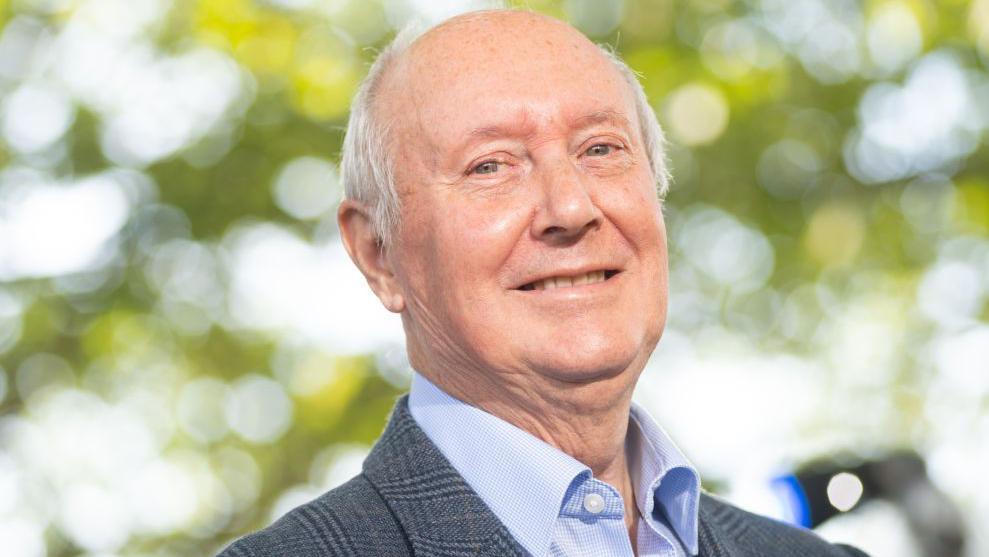Academic and devolution reformer Sir Kenneth Calman dies aged 83

Sir Kenneth Calman led the 2009 review of the Scottish Parliament which suggested extending Holyrood's powers
- Published
Sir Kenneth Calman, the doctor and academic who led the Calman Commission review into devolution, has died aged 83.
In a long career in medicine and public service, he served as chief medical officer for both Scotland and England, was warden and vice-chancellor of the University of Durham and chancellor of the University of Glasgow.
In 2009 he led the review of the Scottish Parliament which suggested extending Holyrood's powers.
His death was announced by his daughter, the comedian Susan Calman.
First Minister John Swinney led tributes to Sir Kenneth.
Writing on X, the SNP leader said: "He made an enormous contribution to public life in Scotland and I enjoyed enormously my many encounters with him.
"I express my sympathy and appreciation to his family."
Sir Kenneth Calman was born in Glasgow in 1941 and educated at the city's Allan Glen's School and the University of Glasgow.
He worked in vascular and transplant surgery before being appointed Professor of Oncology at the University of Glasgow.
Sir Kenneth became chief medical officer for Scotland in 1989, moving to the same role in England two years later.
He took up his post in Durham in 1998, serving for eight years before returning to lead the University of Glasgow from 2006 to 2020.
Sir Kenneth was knighted in 1996 and was a Deputy Lieutenant of Glasgow until his death.
'A horrific time'
In an Instagram post his daughter Susan wrote: "It's a horrific time but I'm lucky to have supportive family, friends and a wonderful partner to hold me up.
"Thanks to the incredible staff at the Queen Elizabeth Hospital in Glasgow for treating him with such kindness and dignity and for the compassion they showed us. It made the bleakest of times more bearable.
"When he was conscious and alert I told him I loved him. He said 'you're wonderful' and I said 'so are you'.
"Grief is so completely, overwhelmingly, physically painful, but as others have said such feelings are an indication of how loved he was, is and always will be."
'A really lovely person to work with'
The review of devolution led by Sir Kenneth was commissioned by the Scottish Parliament in 2007.
It reported in 2009, making 24 recommendations to extend the parliament's powers, including into other tax-raising areas.
It said Scotland should take charge of half the income tax it raised.
His report, which included input from the three main Unionist parties but not the SNP, came five years before the Scottish independence referendum in September 2014.
The UK coalition government of 2010-2014 pledged to implement the findings and used them as the basis for the Scotland Act 2012.
Sir Kenneth went on to chair the trustees of the National Trust for Scotland (NTS) and chaired the board of the National Library of Scotland (NLS) from 2016 to 2020.
A statement released from the NLS said they were "very sad" to hear of his death.
"We remember him fondly as chair of the National Library of Scotland board," the statement said.
"We wouldn't be where we are today without his support and encouragement.
"But most of all, he was a really lovely person to work with.
"Our thoughts are with his family and his many friends."

Prof Sir Kenneth Calman was the ideal choice to lead a review into Scottish devolution.
Erudite, diplomatic and with a kindly manner, his chairing skills were much admired.
His eponymous commission stemmed from a political earthquake in 2007.
The SNP's victory in the Holyrood election that year lifted the lid on the independence question, beginning what was called a "national conversation".
As the new party of government put a referendum on the agenda, the pro-union parties set out their opposition.
But something more had to be done and they talked about a "new agenda for Scotland".
The Commission on Scottish Devolution was set up by the UK Labour government - and opposed by the SNP.
At the end of the day - and most significantly - tax-raising powers were eventually devolved to Holyrood as part of the commission's recommendations.
The former medical man had carried out significant but gentle surgery on the body politic, despite the wider unionist-nationalist dividing lines.
Sir Kenneth's commission helped pave the way for another - more significant - review of devolution in 2014, where the parties saw the advantages of cross-party co-operation.